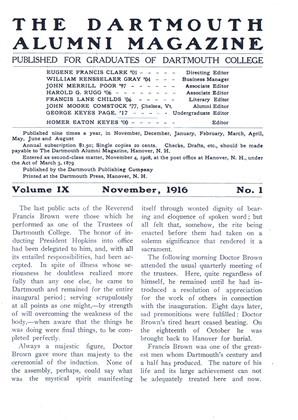As we approach the demands of the future of the college at this particular stage in the world's history, however, there seems to me a single word of caution which should be uttered. At a period of such violent readjustments, when the values which shall be accorded to things physical, intellectual and spiritual are undergoing so much revision, it is more to be desired that institutions as well as individuals shall safeguard openness of mind than that they shall prejudice future action by the too definite recording of preconceived notions toward which subsequent policies are bound to be bent. We are like travelers over unfamiliar trails, who know the point of the compass along which their way lies, but who are without knowledge as to the exact spot at which they will make their camp.
We cannot reasonably attempt at any specific time to solve the whole problem of the relations of the college to a future whose needs we do not know. We should rather recognize the general attributes of our task and attempt to define the spirit in which the college shall make its approach to them. The college has always stood for fullness of life for the individual and has thus by indirection benefited the group. It must from now on, to such extent as it has not done before, have, as its first aim, fullness of life for the group, depending for this largely upon the advantage it can afford the individual. The practical operation may not be so very different in the one case from what it has been in the other, but the modification of motive will be one of those intangible but vastly important influences which will be certain to have much to do with the quality of the spiritual product of the college.
A little less than a century and a half ago Eleazar Wheelock, fired with a great missionary impulse, fared forth into a physical wilderness, overcoming difficulties, offsetting lack of acquaintanceship with his new environment and rising superior to discouragement, and here, in the forest-clad plain of Hanover, reapplied those principles of education, of religion and of service to country and to God for which he had laid the foundations in a land of security and comfort. It is the propulsion of this spirit down through the decades that has resulted in the Dartmouth that we, her sons, so love and reverence.
Today we are summoned forth along uncharted ways into the mazes of a changed life, of a rapidly transforming world. We are summoned into a wilderness of thought. May we not pray with faith that under the guidance of God, working from principles that are among the verities, we may give effectually the service most needed to add depth to the shallows of life, breadth to the straitened places of mind, and height to the lowlands of character! Thus, in truth, shall we be justified in the new life, as we have been in the old, and continuingly we can claim the ancient motto of the College—Vox clamantis indeserto.
 View Full Issue
View Full Issue
More From This Issue
-
 Article
ArticleThe last public acts of the Reverend Francis Brown
November 1916 -
 Class Notes
Class NotesCLASS OF 1912
November 1916 By Conrad E. Snow -
 Class Notes
Class NotesCLASS OF 1912
November 1916 By Conrad E. Snow -
 Class Notes
Class NotesCLASS OF 1912
November 1916 By Conrad E. Snow -
 Class Notes
Class NotesCLASS OF 1910
November 1916 By Sturgis Pishon -
 Class Notes
Class NotesCLASS OF 1910
November 1916 By Sturgis Pishon
Article
-
 Article
ArticleElected Life Trustee
June 1955 -
 Article
Article"All the King's Children"
OCTOBER 1958 -
 Article
ArticleFootball Staff Is Completed
MARCH 1971 -
 Article
ArticleHow to Argue with an Umpire
MAY | JUNE 2014 -
 Article
ArticleTuck School
December 1947 By G. W. WOODWORTH., H. L. DUNCOMBE JR. -
 Article
ArticleFurther Mention
February 1975 By J.H.


